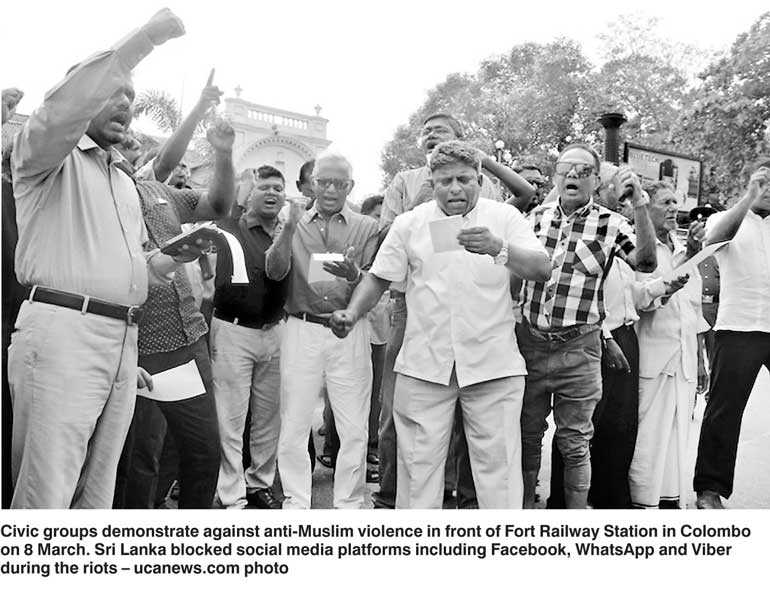Sunday Feb 22, 2026
Sunday Feb 22, 2026
Saturday, 21 April 2018 00:00 - - {{hitsCtrl.values.hits}}

By Niranjani Roland
www.ucanews.com: Sri Lanka is considering criminalising hate speech and fake news on social media after communal violence erupted last month in Kandy.
The Government imposed a week-long ban on social media platforms including Facebook and WhatsApp after the anti-Muslim riots broke out in this popular tourist area in Central Province in the first week of March, prompting calls for calm.
Some groups used those platforms to further divide the country along religious and ethnic lines by sowing disharmony and targeting Muslims.
Jagath Liyanarachchi, an Attorney-at-Law, said the spreading of hate speech on traditional and social media must be stopped if peace is to be restored.
“The Government should control not only hate speech but also communal violence that is being encouraged and spread on various media platforms,” he said.
“Existing laws are more than adequate to curb this, for example the International Covenant on Civil and Political Rights Act [ICCPR] and the Sri Lanka Penal Code, but they have not been properly implemented,” he added.
“However it needs to be handled carefully and in such a way that it doesn’t infringe on people’s freedom of expression. We need a proper system of checks and balances when new laws are put forward.”
Buddhist mobs attacked mosques and Muslim-owned businesses in March resulting in 445 houses and shops left damaged as well as 24 mosques in a matter of days. Three people were killed in the attacks.
They were sparked by the killing of a Sinhalese truck driver by a small group of inebriated Muslims. The man was badly beaten and died later in hospital.
The Government responded by temporarily blocking access to social media sites amid a wave of violent posts and pages condemning Muslims.
Liyanarachchi said if the Government enacts laws to curb hate speech with the agenda of limiting people’s freedom to express themselves on a broader range of topics, it would threaten the basic tenets of democracy.
Sri Lanka operates on the basis of a multi-party democracy.
Germany began enforcing a hate speech law in January and ordered social media sites with over two million members to remove any illegal material as well as hate speech and fake news or face fines of up to $ 62 million.
The sites were given 24 hours to comply with the law once notified or face legal action.
“The Sri Lanka Government tried to criminalise hate speech in 2015 by incorporating that into the penal code but civil society organisations opposed the move,” Liyanarachchi told ucanews.com.
Nalaka Gunawardena, a new media researcher, said people were concerned the law could leave too much room for abuse by politicians.
“Politicians should not be granted unlimited power to suppress the spread of information. That could be dangerous,” he said.
Some concerned groups wrote an open letter to Facebook CEO Mark Zuckerberg this April asking that he implement new “community standards” in local languages to help combat gender-based violence and hate speech.
Sri Lanka’s Cabinet has appointed a committee to investigate the issue while the Attorney-General’s Department is working on adding some restrictions into the legal code, according to Harin Fernando, the Minister of Telecommunication and Digital Infrastructure.
He said whispers in Government circles suggest Sri Lanka may go the same way as Malaysia, which recently passed a fake news law many consider too extreme.
Malaysian Prime Minister Najib Razak announced its enactment at an event marking National Journalist’s Day on 11 April, a date opponents find ironic given their claims that it curtails press freedom and freedom of expression in general.
It was one of the fastest laws ever passed by Malaysia’s Parliament.
Social media campaigner Palitha Fernando (no relation to the Telecom Minister) said the Government must face corruption within its ranks head-on rather than trying to use new laws to silence whistle-blowers.
“Let people criticise those who are corrupt and who violate the law,” he said. “That is our right as citizens.”
(Source: https://www.ucanews.com/news/sri-lanka-mulls-criminalizing-hate-speech-fake-news/82096)